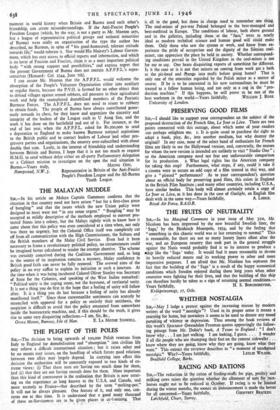THE MALAYAN MUDDLE SIR,—In his article on Malaya Captain Gammans
confirms that the situation in that country need not have arisen but for a first-class piece of bungling " and that the issues which the new Union policy were designed to meet were not " in any sense urgent." " Bungling " may be accepted as mildly descriptive of the methods employed to convert pro- tected States into a colony, but the Malays rightly wish to know how it came about that this policy was even considered at a time when, not only 'was there no urgency, but the Colonial Office itself was completely cut off from all communication with the High Commissioner, the Sultans and the British members of the Malay Civil Service. Even had it been necessary to frame a revolutionary political policy, no circumstances could be imagined better calculated to render the attempt abortive. The scheme was certainly conceived during the Coalition Government and, so long as the source of its inspiration remains a mystery, Malay confidence in British good faith can never be fully restored. The avowed aims of the policy in no way suffice to explain its initiation at such a juncture. At the time when it was being incubated Colonel Oliver Stanley was Secretary of State for the Colonies, and speaking of the West Indies remarked: " Political unity is the coping stone, not the keystone, of territorial unity. It is not a thing you do first in the hope that a feeling of unity will follow after. It is a thing you do last because a feeling of unity has already manifested itself." Since these statesmanlike sentiments can scarcely be reconciled with approval for a policy so entirely their antithesis, the suspicion is difficult to avoid that the policy emanated from somewhere inside the bureaucratic machine, and, if this should be the truth, it gives rise to some very disquieting reflections.—I am, Sir, &c.,


























 Previous page
Previous page